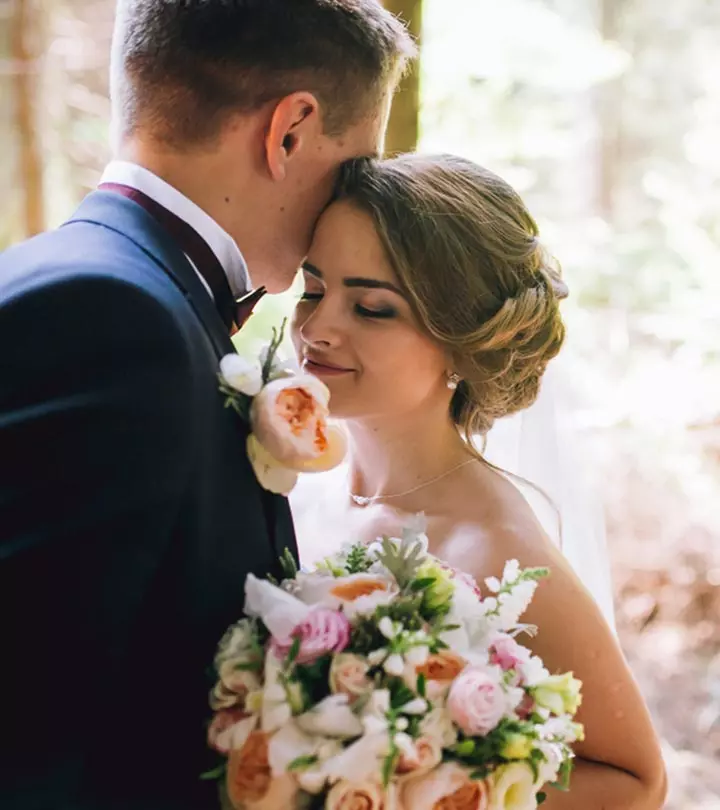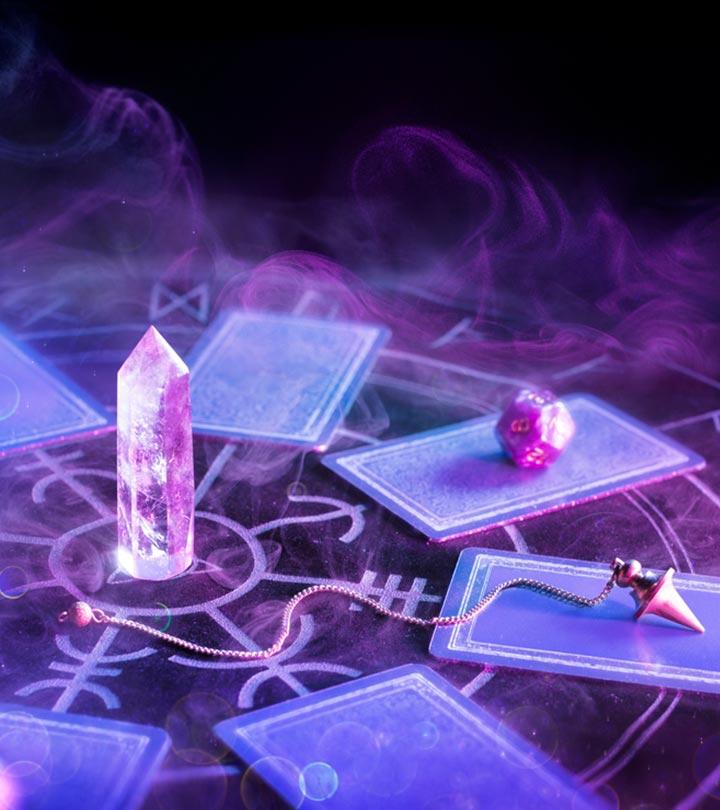6 Stages Of A Relationship That All Couples Should Understand
Grow stronger together and understand your partner better as you explore all stages of your bond.

Image: Shutterstock
Falling in love is easy; enduring in love takes work! Some partners easily fly through all the stages of a relationship, overcoming all the ups and downs together and growing from strength to strength. Other relationships fail under pressure, fall apart, and head off in different directions due to a lack of trust, compatibility, loyalty, and patience.
Every couple needs open communication, honesty, vulnerability, understanding, and effort. Understanding these stages helps you navigate any potential threats you may face. Scientists studied the ins and outs of love within relationships and came up with a list of 6 main stages that couples go through. We have listed some tips and hacks to help you get through these stages and make your relationship work.
In This Article
6 Stages Of A Relationship
Stage 1: The Euphoric Stage
The first stage of a relationship is the euphoric stage or the honeymoon period. It is the fresh, intense, first love stage that all couples go through when they first get together. Couples in this stage feel intense joy and giddiness in the presence of their partner. Their love is passionate, and they find it hard to stay away physically.
When people are in this stage of a relationship, they often feel that they have found their soulmate. Couples in this stage are strangely extremely compatible with each other. They don’t want any boundaries and want to be together all the time. They seem to merge into one being, or at least desperately want to do so.
However, as far as science is concerned, this stage is a fancy, make-believe stage that often shuts down the rational reasoning part of our brains. Couples in this stage usually experience biochemical changes in their brain. They have a cocktail of happy hormones coursing through their body – such as oxytocin, dopamine, and endorphins – which initiate and maintain a state of intense infatuation.
The brain on the love drug can often lead us to feel “addicted” to our loved one and to ignore red flags, incompatibilities, or any other issues. Also, while they are in this early stage, people show a decrease in the activity of their brain’s prefrontal cortexi The front part of the brain that performs executive functions like memory, learning, and cognition. , which deals with the negative judgment of others.
What To Do In This Stage
Enjoy it! This is the stage of love that makes dating someone so intriguing and delightful. However, be aware that your emotions are heightened, and your power of reasoning is compromised. Take some time to step back and study your relationship – you need to honestly question yourself if this person would be the best match for you in the long run.
Take your time in making any decisions that will impact your life. This stage can fog your vision and affect your decision-making capabilities. It may make you want to dive headfirst and blind into situations that may adversely affect you in the long run. Whether you like it or not, the temporary feeling of infatuation will eventually fade away, so don’t make rash decisions just because you are “in love” or because “all is fair in love.”
 Quick Tip
Quick TipStage 2: The Early Attachment Stage
In this stage, the more evolved part of our brains begins to take over. The ventral pallidum, the region of our brains that is linked with feelings of attachment, gets more active. While you still get high doses of “love” hormones like oxytocin and vasopressin, the reasoning part of your brain starts to function again. You will feel “in love” with your partner at this stage but realize that you both are different people with different wants and needs. Both these relationship stages deal with couples who are very much in love and willing to move towards a shared future.
What To Do In This Stage
You will know that you have reached this stage when you can sleep again! You will be able to think of other things other than your partner 24/7. Your love will turn richer and deeper, and the more you get to know your partner, the stronger your bond will grow. By now, you both would have gone through some difficulties together, which would make you both closer. It is important to support each other and work towards a partnership that brings out the best in both of you.
Stage 3: The Crisis Stage
The third stage of a relationship is the crisis stage, which deals with doubt and denial. In this stage, we finally start to notice the differences and issues between our loved ones and us. The honeymoon is finally over, and we are woken up from our trance with a loud bang.
The power struggle between couples increases, and resentment starts to brew. Unfortunately, disagreement and friction are natural in a relationship. This doesn’t mean that the love is gone. But now, the feelings of love are mixed with irritation, doubt, and alienation.
As the feelings of disappointment increase, so does the biological response to stress. Partners start to either fight or withdraw, depending on their circumstances, attachment history, and personality. Couples feel compelled to fight for their values and beliefs, and both try to get everything to run their own way.
What To Do In This Stage
To make it through this stage, conflict management skills and conflict resolution techniques are essential. You need to learn how to face relationship issues head-on and de-escalate conflicts. No matter how angry you may be, it is important to treat each other with respect. You need to remember that arguments and power struggles are normal in a relationship – and they are not a sign that the relationship is doomed. Learn to distinguish between unhealthy control issues and healthy disagreements and when conflict arrives, always look to repair things with your partner. Repair, or its absences along the way, will set the path for your relationship to succeed or fail.
Also, really consider getting the help you need with a specialized couples therapist at this stage. People usually wait an average of six years of being unhappy before seeking aid to repair their relationship. And as it happens, timing can have a profound impact on its result. Just think about it: nobody wants to endure six years of resentment, frustration, sadness, and estrangement. If you wait that long (stage 4 and 5) to go to a couple’s therapist, your motivation might be low and, not to mention, you will probably be stuck in a negative cycle that you won’t know how to get out of.
Stage 4: The Disillusionment Stage
The next stage of relationships is disillusionment. This is the stage where it may feel like the end of the relationship for some couples. At this juncture, everything is out in the open, and the power struggles have come up to the surface. The issues that the couple had constantly been shoving under the rug are now just too obvious.
Some become excessively vigilant and paranoid, ready to jump at each other’s throats at the slightest provocation. Others may slowly and quietly drift apart over time. They avoid conflicts and don’t want to expend any energy into maintaining the deteriorating relationship. At this point, our initial feelings of passionate love have become a distant memory.
What To Do In This Stage
Create a safe space and clear the air. Stop avoiding issues and shoving problems under the rug. As repetitive, pointless, and tiring these arguments may feel, ignoring them means they are just going to pile up and become a huge lump under the rug. And it is easy to trip over it and never recover from the fall. Yes, it’s true that there may be a lot of negative energy towards each other at this stage.
To deal with this, practice showing kindness and affection even when you are angry or upset. You can feel angry or annoyed at your partner but still spend time together. At this stage, the brain starts to zero in on the relationship’s deficiencies. People tend to ignore things that are going right and focus on everything that is going wrong. Try practicing intentional gratitude. Remember the reason you two fell in love in the first place. Make a note of all the things that you appreciate about your partner.
Stage 5: The Decision Stage
This stage of relationships is called the decision stage because the partners reach a breaking point. You may experience emotional breakdowns, start leaving your home for hours to avoid each other, or move out. Self-protective behavior is common at this stage, as are remoteness and indifference. You know you have reached this stage when you begin to contemplate leaving for good and even make plans for breaking up. You may even crave a new beginning with another person. This is when we decide whether to leave, stay and try to fix the relationship, or stay and do nothing.
What To Do In This Stage
At this stage, learning or improving your communication skills will not work since the problem of miscommunicating has long passed. You have an entirely different problem if you have reached this point. You will have a real chance of saving the relationship only with the help of an experienced couples therapist, preferably an Emotionally Focused Therapy (EFT) trained professional.
Most often, couples want to get out of the relationship because they believe their partner is the problem without realizing that they are not. However, by mapping the origins of their issues and pain and being vulnerable, both partners not only get the opportunity to understand each other but also process their primary emotions so they can re-engage in a more secure way to probably give the relationship another try.
Even years of resentment or estrangement, which many feel can never be worked upon, can fade away. You must take charge and accept your own role in the deterioration of the relationship. Also, you need to commit to achieving real change. We can use this opportunity to learn the lessons that will enable us to become better people and allow the relationship to grow and deepen (Atage 6). However, if couples make a choice to go their separate ways, they can work on doing this in a constructive way and not make it a dirty battle of the exes.
Stage 6: Wholehearted Love
The last stage of a relationship is wholehearted love. This is when the relationship is at its best and healthiest. Couples experience self-discovery, true individuation, and true acceptance of each other’s imperfections – both in themselves as well as their partners. This is when people realize that there is no such thing as the “perfect match”, which ironically may be conceptualized by others as a perfect match for being so good.
Of course, there is still a lot of hard work involved in this stage, but now, the couples are aware of their differences and have learned how to listen to each other. They know how to deal with uncomfortable conversations and can do so without attacking one another or feeling threatened. At this last stage, couples begin to relax again, laugh with each other, and deeply enjoy one another again. They rediscover themselves and one another and often fall in love with each other once again.
What To Do In This Stage
Nourish your relationship and yourself. Work on appreciating each other’s generosity, humor, resilience, flexibility, boundaries, self-care, and purpose. You can stay in this stage as long as you both are able to sustain your own wholeness as individuals. Make self-growth and self-care your goals and see them change other aspects of your life. All stages of relationships have their pros and cons. The secret is to work towards growing your love for one another at all levels of the relationship.
In a reflective piece by Christine on her blog, she shares how time has changed things in her relationship. And, while change can be tough, it’s actually made her relationship with her partner stronger and brought them closer to each other. Reflecting on the present moment, she remarks, “And most of the time we don’t even need to speak those words aloud, we know each other well enough to say them without speaking (i).”This is testament to the fact that working intentionally on a relationship only fortifies the bond.
 Quick Tip
Quick TipHowever, there are some relationships that naturally fade away due to incompatibility, lack of trust, and toxic behavior. The relationship ends up in a termination stage.
The Termination Stage
It is the final stage that marks the end of a relationship. Here, both individuals undergo a variety of emotions ranging from grief to anger to acceptance or relief. This is a phase of closure, where both partners decide to part ways and move on in life. It can involve discussions relating to the division of assets, children’s custody, return of items, and new living arrangements. Often, both people rely on their family and friends for emotional support and strength. A few individuals may seek professional help or therapy to cope with challenging situations. However, there is no established pattern when it comes to the termination stage as it is a very individualized process and varies from relationship to relationship.
How To Keep The Love Going And Growing
How can we keep our love going strong? One of the best ways of keeping the spark and conquering all phases of a relationship is by being spontaneous and experiencing new things – together. Doing exciting and challenging activities can help your bond grow stronger. When you get into a relationship, the goal should be to literally increase the ‘person’ you are. You take on your partner’s experiences and perspectives and add them to your own. This also includes their resources and social status. Stop judging your partner and accept them for who they are.
Knowledge is power, and when you know what to expect in a relationship, it helps you stay prepared. While not every relationship goes through the 6 stages, it is more common that they do — euphoric stage, early attachment, crisis, disillusionment, decision, and wholehearted love. Everything seems perfect in the first two stages, and the couple develops an adoration for each other. After that, however, things spiral out of control, and the relationship is tested through the stages of crisis and disillusionment. People face their partner’s shortcomings, leading to a conflict. While many relationships break at this juncture, those that decide to stay together reap the fruit of wholehearted love. Acceptance and a non-judgemental attitude can help you sustain a relationship that might have otherwise crumbled.
Infographic: How To Disagree With Your Partner Respectfully
No matter the stage of your relationship, both of you should maintain your individuality. Often, you may become so invested in the relationship and in maintaining the romance and intimacy that you may lose your identity. This shouldn’t be the case. Preserving and respecting each other’s individuality can help you maintain a long-term, healthy, and balanced relationship. Instead of always giving in to your partner, learn to disagree respectfully and politely.
Check out the infographic below to see how you can disagree with your partner respectfully. Illustration: StyleCraze Design Team
It is a well-known fact that relationships can be complicated businesses. The rollercoaster of emotions, feelings of love, possessiveness, and sometimes even hurt can leave you feeling exasperated and confused. In such cases, it helps to have a basic knowledge about various stages of relationships that all couples go through to know what to expect. For instance, your relationship may begin with the euphoric stage, where both of you are smitten, and it is almost fairytale-like. After that, however, your relationship will inevitably go through stages of crisis and disillusionment to finally mature into wholehearted love.
Frequently Asked Questions
What are the 5 bonding stages for a man?
Appreciation, infatuation, attraction, impression, and conviction are the 5 bonding stages for a man.
How soon is too soon to tell someone that you love them?
Few say it is too soon to tell someone that you love them within a period of 3 – 6 months. Some also feel expressing love as soon as you feel it could be too early. However, there is no hard and fast rule in this regard. It completely depends on the bond shared between the partners.
Is it OK not to talk every day when in a relationship?
Although communication is key in every relationship, if you feel it is becoming monotonous by talking every day, it is better to give each other the space. You can initiate interesting conversations after a while.
Key Takeaways
- Understanding the different stages of a relationship can help you navigate yours better.
- You can deal with crises and disillusionment in your relationship by improving your communication skills.
- Self-growth and self-care are important for improving your relationship through all its stages.
Embark on a fascinating journey through the five inevitable stages of relationships. Discover how couples navigate crucial milestones, shaping the destiny of their partnership. Brace yourself for insightful revelations!
Personal Experience: Source
StyleCraze's articles are interwoven with authentic personal narratives that provide depth and resonance to our content. Below are the sources of the personal accounts referenced in this article.
i. Marriage Isn’t Always Fun (And That’s Okay)https://amorninggrouch.com/2016/07/17/marriage-isnt-always-fun-and-thats-okay/
Read full bio of Brian Tavizón
Read full bio of Asmita De
Read full bio of Reshma Latif

































